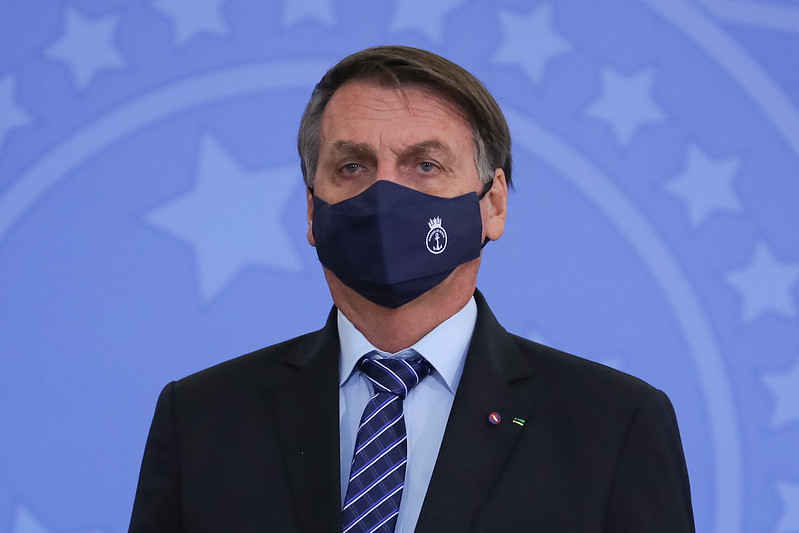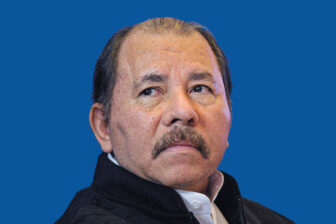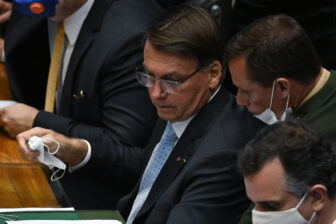This article has been updated.
On the eve of the January 6 invasion of the U.S. Capitol, Eduardo Bolsonaro, the Brazilian president’s son, was in Washington, meeting with Ivanka Trump and other leaders of their global conservative movement. When the rioters fell short of their intended goal, and Joe Biden was successfully sworn in, Bolsonaro, who is also the head of the Foreign Affairs Committee in Brazil’s House of Deputies, reacted with dismay — at the rioters’ apparent incompetence. “If they had been organized, they would have taken the Capitol and made demands that would have been previously established by the invading group,” he said. “They would have had a minimal war power so that nobody (on their side) would have died — to have killed all the police inside or the congressmen they all hate.”
President Jair Bolsonaro’s dramatic Cabinet reshuffle on Monday seems designed to avoid a similar fate — to get organized now, and avoid being “illegitimately” removed from office later. Though that may sound to some like conspiracy talk, it is a logical reaction to recent developments in Brazil, including the world’s worst surge of COVID-19 deaths, a renewed threat of impeachment from Congress, and the unexpected emergence of former President Luiz Inácio Lula da Silva, the Brazilian right’s walking nightmare, as a strong challenger in the 2022 election. Under pressure, Bolsonaro is doubling down on his closest allies and, especially, trying to ensure he has the support he needs from Brazil’s military — those with the “ war power.” The erstwhile “Tropical Trump” is determined to avoid his idol’s perceived errors.
Bolsonaro made changes Monday to almost a third of his Cabinet, including critical areas like the Justice Ministry and Foreign Ministry. But his most important decision was to fire Defense Minister Fernando Azevedo e Silva. A retired general, Azevedo publicly distanced himself from Bolsonaro during a previous bout of institutional instability in May 2020, when the president declared he wouldn’t “allow more interference” from the Supreme Court and that “the Armed Forces are on our side.” In response, Azevedo published a letter declaring the military separate from politics and calling for “independence and harmony” among the three branches of government. Though the confrontation subsided, Bolsonaro reportedly never forgave him, and decided the stresses of 2021 called for a more loyal figure who could provide him with unconditional military support. Azevedo clearly alluded to the reason for his firing in a letter Monday, saying he had “preserved the Armed Forces as institutions of state” under Bolsonaro’s rule.
It’s unclear whether Bolsonaro’s power play will work — or backfire. The Armed Forces are split between an officer corps that came of age during the disgrace that followed the 1964-85 dictatorship (whose “anniversary” is Wednesday), and generally is loath to be seen as political, and a younger generation whose hatred for the left tends to overcome such misgivings. Through intermediaries and other means, the officer corps has made clear on numerous occasions in 2021 that, even though retired and active-duty military hold dozens of key positions in this government, their support for the president is not unconditional. The heads of Brazil’s Army, Navy and Air Force all left their jobs on Tuesday, the defense ministry confirmed, in what sources said was a mass resignation in protest of Azevedo’s firing. “The news here is that the Armed Forces are REFUSING to support an authoritarian project by an isolated president,” a person close to Brazil’s military told me. It was unclear whether it would ultimately strengthen Bolsonaro by allowing him to appoint more loyalists, or leave him weaker.
The reasons for Bolsonaro’s insecurity are easier to understand. COVID-19 has been claiming more than 2,500 lives per day, causing Brazil to account for a third of all global fatalities in recent days. Brazil’s political and business elites blame the president’s denialism and disorganization for much of the carnage — which has also taken a renewed toll on the economy, with some now expecting another (minor) recession in the first half of the year. On March 24, Arthur Lira, the speaker of Brazil’s House, effectively put the president on notice — avoiding the word “impeachment,” but warning that Congress has “remedies” at its disposal, “some of them fatal.” In a country where two presidents have been impeached since the 1990s, the threat was clear enough. Most of Bolsonaro’s Cabinet changes were designed to shore up the alliance with the Centrão, the shape-shifting, notoriously disloyal coalition to which Lira and other key Congressional leaders belong.
But if the gambit fails — and history shows it might — Bolsonaro’s clear backup plan is to have as many men with guns on his side as possible in the event of an impeachment or an adverse result in the 2022 election. Yes, that may sound “alarmist” or “melodramatic” — and it’s unclear whether the Armed Forces, or the rest of Brazil’s still-resilient democratic institutions, would allow for such a sequence of events. But one of the key lessons of January 6 in the United States was to listen carefully when aspiring autocrats tell you who they are, and what they plan to do. Nostalgia for the dictatorship, and hatred for the “communist” left, have been the only consistent ideological threads of Bolsonaro’s 30-year political career. In just the past few weeks, the president has warned of possible fraud in the 2022 elections, referred to the Army as “mine,” pushed decrees to allow his supporters to arm themselves, and told a crowd of military cadets that “if it were up to me,” Brazil would be living under a different, presumably authoritarian, political system. With the exception of North Korea’s Kim Jong Un, no other major global leader waited as long to recognize Biden’s election victory. The reasons may have had less to do with ideological affinity, and more with an eye toward an uncertain future.
This article was updated with the departure of Brazil’s military chiefs on Tuesday.








